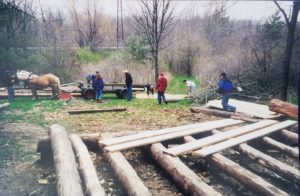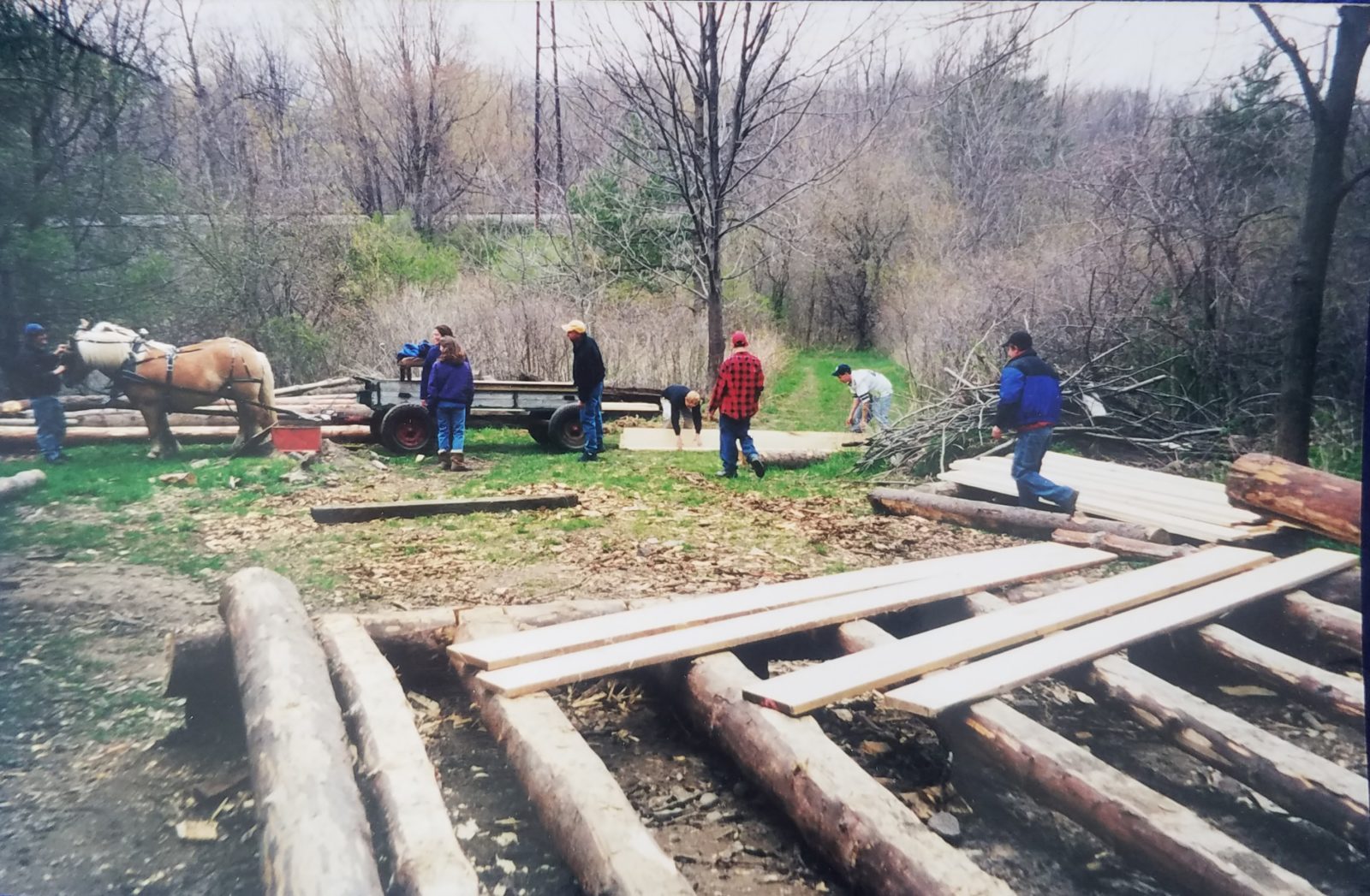“Were you teaching a class full of innocent children?” ~ Alan. Jackson
The grassy-assy scent of cow shit charged our nostrils in the early-morning air. Fresh chunks of mud and sprinkles of dew beaded my hiking boots as I tromped through a furrowed field at Rush Campus, an alternative school where I taught History and English to grades 7-12. Science teacher Jeanne Burns and I were leading a small squad of students, many of whom suffered with some degree of learning or emotional disability.
 We were returning from our outdoor classroom where we had been using primitive hand tools to construct a 20’ x 22’ log cabin from scratch. We labored to fortify self-esteem, goal-setting, camaraderie, teamwork. Nothing could be more serene. Jeanne remarked that it was indeed a fresh and glorious day.
We were returning from our outdoor classroom where we had been using primitive hand tools to construct a 20’ x 22’ log cabin from scratch. We labored to fortify self-esteem, goal-setting, camaraderie, teamwork. Nothing could be more serene. Jeanne remarked that it was indeed a fresh and glorious day.
About 200 yards from the main campus, we were doused with a metaphorical cooler of ice water. A 16 year old sophomore named Brian raced uphill, his voice cracking as his lungs struggled to keep pace with his heart and trembling legs. He doubled over in front of us with both hands on his knees.
“Ste, Steve . . . Jeanne. . . we’re being attacked. New York City! Pla…planes crashed into some buildings.”
“America being attacked? I questioned. “Come on.”
“It’s all over the TV. Terrorists!” He settled a little before adding: “They say it was terrorists .”
“Steve, do you think we are really under attack?” Jeanne asked with horror in her eyes.
“I don’t know.” I answered.
Brian, now on one knee and shaking his head. “A lot of people got hurt, Steve, a lot of people. S…some even jumping out of windows. It’s bad, Steve, really bad.”
The younger students pummeled us with questions. “Is America in trouble?” “Are we being bombed?” “Is it safe to go home?” “What’s going to happen to us?”
Though I desperately wanted to bolt to the nearest television, I couldn’t. Instead, Jeanne and I huddled them close as we led our little troop patiently back to the school.
Our first obligation was to comfort the students. Each was identified as having special needs which allowed school staff to “bend” many rules to accommodate the child. Principal Dan Reynolds empowered teachers to seize any opportunity to benefit the students. He led by example and justified much of what happened on campus by stating. “If it’s good for kids, let’s do it.” The entire teaching staff adopted this philosophy which brought advocacy and friendship to thousands of special children. “Don’t worry you guys, we’ll be all right,” I told them. “We have a good military and our president won’t let anything bad happen to us. You can count on that!”
“That’s right,” Jeanne confirmed. “You kids will be all right. Let’s go see what happened before we all get worked up. OK?” She was always so much better at de-escalation that I was. A few steps later, Jeanne looked at me for reassurance. I flashed a grimaced pout as if I was about to cry.
The attacks forced these students into a cauldron of uncertainty, anxiety and fear. There were only three veterans on campus which made us the likely sources for information. Neither of knew more than the other, but that did not stop the onslaught of war-related questions. Steve French served in the Army during the Cold War and was now a school Social Worker. Bill Farrell fought as an Infantryman during WWII. He was retired and worked with his wife teaching many subjects on a part-time basis. I was the most recent veteran having served as a Civil Affairs officer in Bosnia in 1996. The kids hung on every word.
Once inside the school, we joined a shocked sea of the students and staff who gathered in front our rabbit-eared TV. Surreal story after story aired “live.” Newscasters scrambled to convey accurate information, being interrupted often for “the latest breaking news.” The images of planes crashing into the Twin Towers in New York City looked like a movie. But this was no movie.
It took me about a minute to assess the threat, and retreat into “battle mode” – that almost automatic mindset of a soldier – an unnatural resistance to emotion and pain that is programmed deep within to keep us hyper-alert and steady in the face of crisis. Surprisingly, my “battle-mode[j]” didn’t last much longer than a few minutes.
Jeanne later remarked to me, “Steve, I remember your face, verifying what I could not believe to be true – our country was really at war!”
“I’ll be right back,” I said as I excused myself from the room.
My eyes welled with tears as I fumbled for the keys to my truck. I slammed the door and collapsed over the steering wheel. Though blinded with tears, I could see the future as clearly as if I had a crystal ball. I knew that Americans had just died from an attack of war. And that I, Special Ed Teacher Steve McAlpin, would be among the first soldiers to respond to whatever the President asked of us. I didn’t know where I would go or what I would do, but I knew that I would be going, and that was all I really needed to know.
